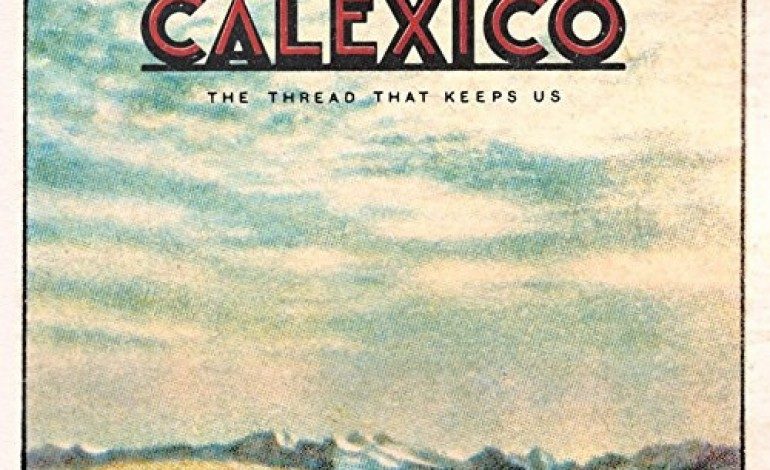

A Sprawling Odyssey
On their ninth studio album, prolific alt-folksters, Calexico, are showing no signs of creative fatigue, despite the impressive scope and longevity of their career. Comprised of a whopping 22 tracks, The Thread That Keeps Us is a rambling journey of a record that runs the gamut from retro-tinged alt-rock, to sentimental folk to southwestern instrumental tracks that would fit right into a Tarantino film. It’s a lot to take in with an impressive display of vision and expertly honed skills.
The lead single, “End of the World With You,” sounds like it’s right out of the nineties, like U2 with an Americana edge. It’s the most mainstream, and least interesting track on the record, though expertly produced. By track two, “Voices in the Fields,” Calexico’s trademark tribalesque grooves and lilting trumpet begin to trickle in, accented by searing electric guitar solos. The first half of the record clips along with lots of groovy surprises thrown in, like the first of several instrumental interludes on track four. “Spinball” is an eerie, atmospheric break, and “Flores y Tamales” is the spirited all-in-Spanish cumbia jam.
“Under the Wheels” juxtaposes a ska vibe with spoken-word-like verses, and a soaring chorus with subtle political messaging: “Under the wings of the war machine, always someone else’s scheme/ Show me a sign when the world falls apart, coming together for all of the corners of life.” On their website introduction to the album, vocalist/guitarist Joey Burns explains: “Instead of writing straight-up protest songs, I want to tell stories.” This gentle social awareness permeates the subject matter on much of the record, in a nuanced and elegant manner. Even on grittier tracks like “Dead in the Water,” when the messaging is darker and more aggressive, there is a subtlety to the dramatic theme: “Don’t try to look away or stop me in my path/I make the law and I decree a new kind of wrath.” With a nihilistic ’80s punk vibe, the song is grungy and cool.
A pair of folk ballads are sweet standouts: “The Town & Miss Lorraine” is a graceful, theatrical story song with a classic ’70s folk sound, while on “Music Box,” Burns speaks to his children, assuring them that they are safe and loved even when the world seems to be spiraling into chaos. He sings, “I want you to know this song is for you/ I want you to know that I love you.” “You look into a child’s eyes and you see something hopeful, even if they’ve maybe heard little pieces of what’s going on in the news,” Burns writes. “I think that’s pretty much the case with this band: we still have hope, and we’re still so excited to be making this music together.”
Mid-record, the pace slows way down, with back to back instrumental tracks “Longboard” and “Luna Roja” followed immediately by “Curse of the Ride.” Three songs in the same tempo, in the same key, with the same vibe, is a tough active listen, and as a trio, they seem to form a sort of film score meant to lilt along in the background.
Recorded at Panoramic House Studios in Marin County, Northern California, the environmental impact on the shape of the record is very clear on the second half of the album. Listening along, it’s easy to envision the band getting swept up in the bohemian vibe of the picturesque studios, writing sessions evolving into late night jams, resulting in a loosely structured, evocative and often dreamlike and meditative. It could almost function as a long-form concept album if there were a bit more focus and thematic cohesion. Burns writes: “Going into making the album, the only thing I really knew for sure was that I wanted there to be moments that felt free and spontaneous—just these moments of no time, no lyrics, no agenda.” The clearest message that lingers by the end is: life is hard, and the world can be scary, but music sustains us and there is so much beauty in the journey.
